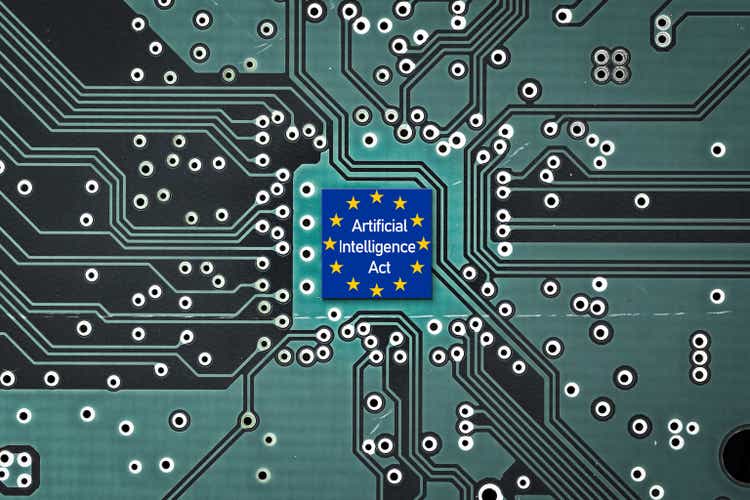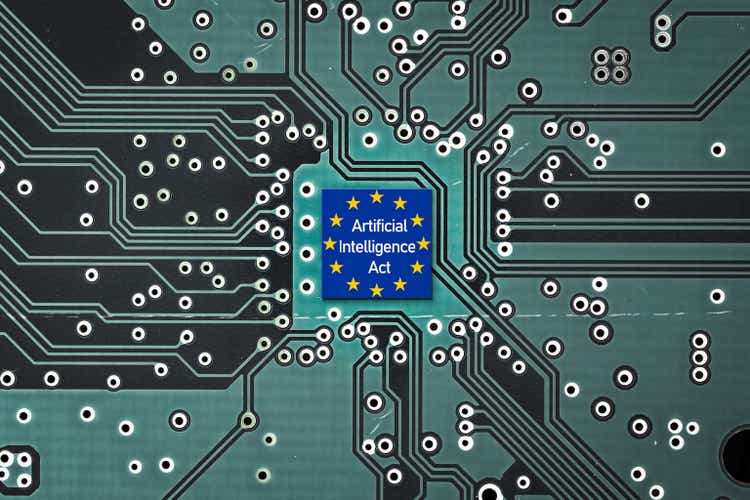
Tanaonte/iStock via Getty Images
Some of the most well known AI models from Big Tech companies are falling short of compliance with EU rules in areas such as cybersecurity resilience and discriminatory output.
The framework is developed by Swiss startup LatticeFlow AI and its partners at two research institutes, ETH Zurich and Bulgaria’s INSAIT. They noted that the release includes the first technical interpretation of the EU AI Act, mapping regulatory requirements to technical ones.
The launch also features the first compliance-centered evaluation of public foundation models from organizations such as Microsoft (MSFT)-backed OpenAI, Meta Platforms (META), Google, a unit of Alphabet (GOOG) (GOOGL), Anthropic, and Alibaba (BABA) against the EU AI Act technical interpretation, according to LatticeFlow.
The tool provides a score in the range of 0 to 1 to AI models across dozens of categories, including technical robustness and safety.
Generative AI services have become the talk of the town since the launch of OpenAI’s ChatGPT in 2022. Globally, companies have launched their own large language models, or LLMs, which can provide services such as content, image, video and voice generation, to name a few. However, the way this technology should be used has encouraged lawmakers to draw up specific rules around “general-purpose” AIs.
The EU’s AI Act would come into effect in stages over the next two years.
AI models developed by Alibaba (BABA) Anthropic, Microsoft (MSFT)- backed OpenAI, Meta and Mistral all received average scores of 0.75 or above, according to a leaderboard published by LatticeFlow, Reuters reported.
However, the “Large Language Model Checker” uncovered some models’ shortcomings in key areas, spotlighting where companies may need to divert resources in order to ensure compliance,” the report added.
“The European Commission welcomes this study and AI model evaluation platform as a first step in translating the EU AI Act into technical requirements, helping AI model providers implement the AI Act,” said Thomas Regnier, the European Commission’s spokesperson for digital economy, research, and innovation.
Discriminatory output has been an issue in the development of generative AI models, reflecting human bias related to gender, race and other areas when prompted.
While testing for discriminatory output, LatticeFlow’s LLM Checker gave OpenAI’s “GPT-3.5 Turbo” a relatively low score of 0.46. In the same category, Alibaba Cloud’s “Qwen1.5 72B Chat” model received only a 0.37.
Testing for “prompt hijacking” — a type of cyberattack in which hackers disguise a malicious prompt as legitimate to get sensitive information — the LLM Checker awarded Meta’s “Llama 2 13B Chat” model a score of 0.42. In the same area, French company’s Mistral’s “8x7B Instruct” model received 0.38, the report noted.
“Claude 3 Opus”, an LLM built by Anthropic, which is backed by Amazon (AMZN) and Google, received the highest average score, 0.89.
“We encourage other research groups and practitioners to contribute by refining the AI Act mapping, adding new benchmarks, and expanding this open-source framework,” said Martin Vechev, Full Professor at ETH Zurich and Founder and Scientific Director of INSAIT in Sofia, Bulgaria.
